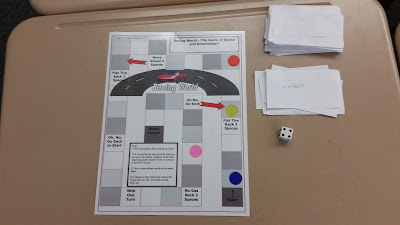Recently, my honors algebra 2 class studied radicals. Among other things, we needed to build
fluency in using operations and using radicals to solve equations. Here are a few of the resources that students
used during class to practice.
Simplifying radicals board game:
I can not remember where I got this board
game template. At one time, I googled something
like “free printable board games” and
downloaded a bunch of them to use once each unit. In general, I print some practice problems
using Kuta Software and cut up the worksheet to make problem cards. I print and laminate the board game to use
year after year. I use dice and bingo
counters that I purchased online. This
is a simple alternative to a worksheet that the kids always seem to enjoy. The board games work best when the problems
are quick. The game part is not fun if
the kids can only complete 2-3 problems and don’t actually get to move their game
token around the board.
Multiplying and dividing radicals dice:
Again, this is an easy substitution for
practice problems. I write a different
radical binomial on each side of 2 dice.
I use a two colored counter that can be flipped to determine
multiplication or division. These dice
are nice because they are quite. You
need to use permanent marker to avoid smudging though. You can remove the marker with a magic eraser
or nail polish remover. I try to use
this activity once per chapter as well.
Students like the variation in types of practice that they do in class.
Solving equations using square roots game:
I downloaded this powerpoint template and
this game from TPT. Boom is another game
that I use about one time per unit. I
take practice problems from a worksheet and put them onto the cards. Students take turn drawing a card and solving
it. If their answer is correct, they
keep the card, if not it is returned to the pile. If a student draws a Boom card, they lose all
of their cards. The player with the most
cards at the end of the game wins.
I hope that you have found some ideas to help students have fun while practicing math skills!


